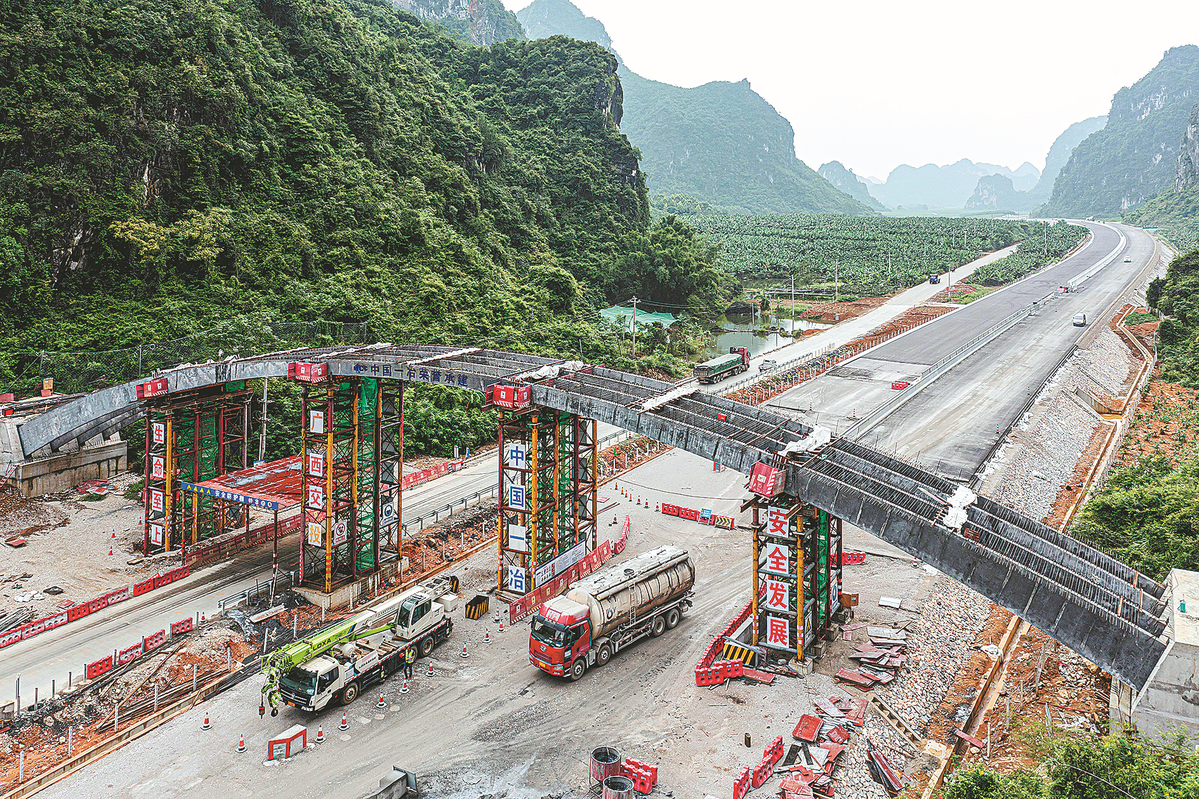Skywalk in nature reserve made for monkeying about


A skywalk corridor for monkeys above an expressway in the mountains of Chongzuo, Guangxi Zhuang autonomous region, was recently completed to preserve the animals' access to their habitat.
The expressway passes through the Encheng National Nature Reserve, a habitat for Francois' leaf monkeys, one of China's most endangered species. Though still under construction, it was feared the expressway could affect their freedom of movement and access to food.
"Adult males could even walk unknowingly across the expressway, placing them in danger of being hit by passing cars," said Gao Xu, project manager of the China First Metallurgical Group, the company responsible for the skywalk and the expressway, which is headquartered in Wuhan, Hubei province. "The aim of the corridor is to ensure environmental continuity, maintain exchanges between different groups of monkeys and ensure the safety of both humans and animals."
The 98.7-meter-long, 10-meter-wide and 19-meter-high corridor was completed late last month and is made of lightweight ultrahigh performance concrete, which is durable and has good tensile strength and crush resistance.
The inner and outer sides of the corridor will be lined with protective nets and planted with vegetation to imitate the natural environment. It is expected to be put into operation in November.
"It will also allow other wild animals to cross over the expressway," Gao said.
The Encheng National Nature Reserve, which covers some 25,000 hectares, is a habitat for forest musk deer and boa in addition to Francois' leaf monkeys, and its north tropical karst forest ecosystem is noted for its abundance of sago palms. It is home to 130 Francois' leaf monkeys, about one-third of the population in Guangxi.
As a result of illegal hunting and the loss of habitats, the monkeys have dwindled sharply, Li Wenhua, director of the administration center of the reserve said, adding that infrastructure projects such as expressways, bridges and railways inside reserves can lead to geographical and reproductive isolation among animals, resulting in the rise of new species or a reduction in populations. In addition, changes to the land, plant cover and water, as well as noise and air pollution also affect the animals' environment.
Li said that Francois' leaf monkeys feed primarily on tender leaves, stems, flowers, fruits and seeds of some 20 plants and trees, including the ceiba, dodder laurel, sand pear and litchi.
"So we plant things they like to eat on and around the corridor, and collect feces and rocks from their habitats to recreate an environment similar to the one in nature," Li said.
The species often traverse the upper canopy in groups of three to 10 and seldom visit the ground. They spend an average of about 65 percent of the time resting, 19 percent feeding, 9.9 percent moving about and about 5 percent on social activities.
"We will also put up barriers and notice boards along the expressway to remind people of the wild animals and promote the message of protecting them," Li added.
The 146-kilometer expressway, with a designated speed of 100 km per hour, will link the Bama Yao autonomous county with Pingxiang city in Guangxi. As a part of the new western region land-sea corridor and the Belt and Road Initiative, it will bridge the gap with ASEAN countries, Gao said. Pingxiang borders Vietnam, and its Youyiguan Port links China to Vietnam and other Southeast Asian countries.
Gao said that the project's environmental impact was taken into consideration from the start, and the expressway takes a 10-km detour to minimize its impact on the reserve. It works to reduce damage to the mountains when building tunnels. It also recycles the soil dug up for the road's creation to restore farmlands, orchards and fishponds.
"Traffic development helps boost the regional economy, during which damage to the environment must be minimized," Gao said, adding that the company promotes green construction by saving land, water, materials and power, as well as protecting the environment.
- Gansu sets up team to probe abnormal blood lead levels in children
- China publishes Han-Tibetan version of major dictionary
- People advised to guard against dengue fever, diarrhea and other diseases
- Exploring China's Xixia Imperial Tombs with Yuanxi
- SCO foreign ministers council meeting to be held in Tianjin
- Foreign officials praise Chinese gardening culture for promoting harmony





































